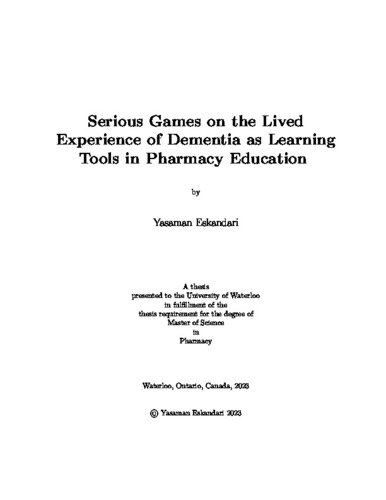| dc.description.abstract | Dementia is a stigmatized and often ‘invisible’ condition which requires clinicians to have a nuanced understanding of the lived experience to build trust and provide better quality of care. Pharmacists are at the frontline of care for patients who may have dementia and there is a need for effective and engaging learning opportunities to prepare them for caring for patients living with dementia. Serious games have gained popularity for their potential in facilitating safe and engaging learning opportunities. However, there are limited applications of serious games in clinical education on the topic of dementia and little transparency on the development process. The thesis work outlined in this project intends to explore how serious games can best facilitate a learning experience for senior pharmacy students to better their understanding of the lived experience of dementia. The primary objective was to develop a serious game with multi-stakeholder input. The secondary objective was to provide game design recommendations for development of serious games on this topic based on end-user play-testing experiences. During both the development and user-testing, qualitative methods were used to gather thorough feedback and understand individual play experiences, namely semi-structured interviews and the think-aloud protocol. To develop a serious game, the game design framework for medical education was adapted in this project, which involved three stages: preparation and design, development, and formative evaluation. In the first stage, a clinician and a systems design expert were consulted to develop the first prototype. In the development stage, the prototype was reviewed by stakeholders including clinicians, people with lived experiences of dementia or care partners, and serious game researchers through semi-structured interviews, resulting in iterative improvements. Stakeholder feedback culminated in the development of a serious game with the goal of helping pharmacy students better understand the lived experience of dementia, in a digital, non-linear story format. During the final formative evaluation stage of game design, 11 senior pharmacy students, a pharmacy educator, and a social worker with expertise in dementia care tested the game. Their learning and play experiences were gauged through the semi-structured interview and think-aloud protocols. The qualitative data was analyzed using the framework method of analysis. Three factors were necessary for creating an engaging learning experience about dementia for senior pharmacy students. The first was facilitating understanding of dementia through an experiential approach using a realistic environment and authentic storytelling. The second was providing a problem-oriented experience by providing meaningful player interaction opportunities and creative freedom. Finally, novelty in the game format was necessary for an engaging experience. Future directions include recruiting more stakeholders and student participants with experiences relating to dementia, and utilizing these recommendations to improve on the game and assessing its impact on student empathy and confidence in caring for patients who have dementia. | en |

